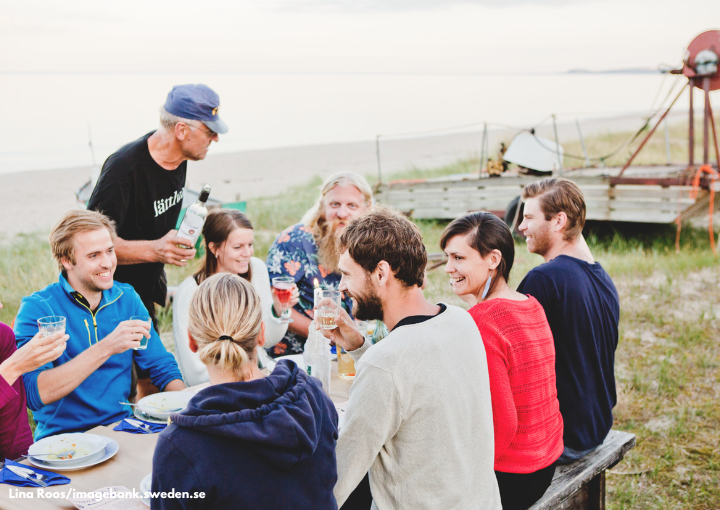#SwedenGate: what’s wrong with Sweden’s food culture?
It all started with a random tweet but things got out of control pretty quickly.
Users responded to that tweet, things escalated with even more Twitter users commenting on the subject with their personal stories.
Soon, it became a (sort of) “scandal” that spread to all social media, even TV screens in Sweden.
Experts appeared to explain the phenomenon.
This is what the already trending #SwedenGate was all about.
Sweden’s food culture was at its core: How hospitable are the Swedes? Would they feed their guests at home?
Let’s see how it all started, what #SwedenGate is and if there is indeed something wrong with the Swedish food culture. Follow us!
How it started
It all started with a pretty random tweet. Here it is.
Not here to judge but I don’t understand this. How’re you going to eat without inviting your friend? pic.twitter.com/bFEgoLiuDB
— Seeker (@SamQari) May 26, 2022
Before that tweet, discussion (and revelations probably) started out on Reddit, an online platform for information geeks, that supports forums and the exchange of information and insights.
The topic was weird customs due to national culture and/or religion.
Someone popped and mentioned something that used to happen in Sweden in the past: when you, as a child, visited a friend’s house, it was customary not to invite you for dinner. Instead, they (your friend included) would go eat dinner and leave you alone for some time until they would finish eating.
No invitation to eat together.
That really sparked a massive controversy. People from other countries were horrified by this “custom” (should it exist). That was the tipping point.
How it escalated
Everyone jumped into the conversation, rather an online row. Swedes and non-Swedes, locals and immigrants. Everyone had a strong opinion and the more they shared it, the more things escalated.
The Swedes (some of them): yes, this used to be a custom, if you were at a friend’s house at dinner time, they’d leave you alone for 15 minutes until dinner was over. Then playing could resume. But this is something that was common last century, especially in the ’60s or ’70s. Now, it’s not popular or even existing at all.
The Swedes (other than the ones above): no, that’s not true. I never came across this custom. The Swedes are hospitable and like to share things.
Non-Swedes: yes, we’ve experienced it, it’s still present.
The rest of the world: How come? We mean this is absurd! It’s rude to leave your guests unattended and go eat dinner in the kitchen. Where is the Nordic culture gone?
Everybody had an opinion and no one really found out if the custom is still alive and if it existed in the first place.
The matter even reached Sweden’s official Twitter account, which tried to highlight the Swedes’ hospitality culture.
The idea of Swedes not offering refreshments to their guests is not a true reflection of how we go about things. Swedes entertain guests of all types in their homes, from simple fika sessions with coffee and a pastries, to full-on brunches, dinner parties, etc.
— Sweden.se (@swedense) May 31, 2022
Why did it escalate?
Things like that seldom escalate that much in Sweden. It’s a country where consensus matters a lot and middle ground prevails.
However, this topic really hit a nerve. It’s about national pride and the image of Sweden to the world. They certainly felt awkward looking rude and inhospitable, to say the least.
Sweden, pretty much as the rest of the Nordic countries do, invest in its international image.
It’s a national brand, they even have a specific set of fonts to use in all instances.
And what is the right way to respond to such a critical issue?
Is it better to deny it, like it never existed, or is it wise to justify it? Can there be a middle ground?
Soon, the topic took to the news on television, where experts were invited to comment on the matter and give a definite answer to this question: Did this custom exist? Does it still exist in Sweden today?
Is there something wrong with Sweden’s food culture?
Some experts and scientists claimed that it existed long ago, back in the previous century, mainly in the decades to come after the 2nd World War.
The reasons for this behaviour could be attributed to poverty (people did not have much food to share at that time) or a social norm that revolved around discretion and respect. The host family did not want to interfere with the family’s plans for dinner and the child’s nutrition.
Today, Swedish society is a very advanced one (socially speaking) and there have been many cultural shifts in the last couple of decades.
Sharing is caring and 99% of Swedes adhere to it today.
Furthermore, most now have open kitchens and the food culture has shifted from individualistic (we cook for our family at home) to a more collective one (we share food and the moments before and after).
Cooking is now big in Sweden and the rest of the Nordic countries. The experience economy is also booming. Experiences matter to more and more Swedes the most.
From cooking together for hygge time to opening their houses to strangers for a taste of the Swedish cuisine, the Swedes do know how to be hospitable. And if they look weird sometimes, hey, give them a break!
Every culture has its weird customs and social norms. Don’t judge so as not to be judged back!

